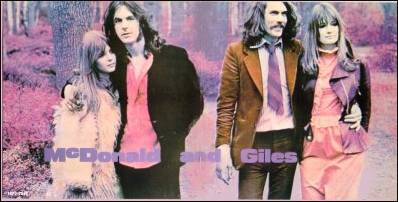
If Ian McDonald had done nothing other than be a crucial (arguably the crucial) member of the band that, in 1969, recorded the album that launched a thousand pretentious, proggy, perfect sonic ships, his status as a cultural icon would be assured. Indeed, if he’d only participated in any single track from In The Court of the Crimson King, no mention of the history and import of prog rock would be complete without name-checking him. Of course, he was much more than the sum of ’69; in addition to being a founding member of Foreigner and a session musician on more than a handful of seminal recordings (including “Get It On” by T. Rex, and the immortal reunion with his former mates on King Crimson’s Red). In between, he and Michael Giles, who left Crimson shortly after the band’s first tour, pulled off one of the more inspired (if criminally unappreciated and obscure) tag-teams in rock history with their self-titled McDonald and Giles in 1970.
But he did play on King Crimson’s incendiary In The Court of the Crimson King, and let’s review the record to see exactly what he played. Saxophone, flute, bass clarinet, Mellotron, harpsichord, piano, organ, vibraphone. Also backing vocals. Oh, and production too. And yes, he co-wrote everything and was the dominant conceptual force behind the title track and that song he co-sings (with Greg Lake who, of course, would go on to grander levels of pomp in Emerson, Lake, and Palmer.) How to grapple with the majesty of “I Talk to the Wind”? Here’s my succinct assessment (this song ranking at #59 in my modest project “The 100 Best Classic Progressive Rock Songs”):
As a part of the whole, “I Talk to the Wind” is an ideal transition, calming the waters after the incendiary “21st Century Schizoid Man” and setting up the concentrated dejection of “Epitaph”; as a standalone track, it’s a stunning tone poem of melancholy—somehow it manages to be somber and gorgeous throughout. Each individual musician is indispensable (on this song; on this album), and while drummer Michael Giles’s subdued but industrious embellishments shine, this might be Ian McDonald’s finest moment: his flute, clarinet and shared vocals are astonishing; an fathomless well that will satisfy and inspire even after countless listens.
The best (and, really, only) way to get a handle on how miraculous this music remains is to absorb it, live with it, and allow it to work its ceaseless, restorative magic. Here’s the introduction of a longer appraisal of King Crimson’s debut (the complete piece can be read here):
Progressive rock’s Rosetta Stone, King Crimson’s In the Court of the Crimson King (released exactly fifty years ago, today) is the purest and most perfect expression of everything this music was capable of being. Sgt. Pepper popularized the then-radical notion of an entire album being an artistic statement, without singles or filler. After the summer of ’67, there was an unprecedented turn toward less commercial, more uncompromised music. King Crimson’s debut, in ’69, signaled the first album that was as much manifesto as work or art: this was among the earliest instances of popular music forsaking even the pretense of anything that might be played on the radio.
To understand, much less appreciate, what these mostly unknown Brits were doing you had to accept their sensibility completely on their terms. Importantly, this was not a pose and it was not reactionary; it was a revolution in music: it still manages to seem somehow ahead of its time as well as — it must be said — timeless. Of course, it also may sound hopelessly dated, depending upon one’s perspective, and that is the whole point: anyone who hears this album and associates it with long hair and sheets of acid are the same kind of simpletons who hear Charlie Parker and envision a strung-out freak wailing away in a smoked-out nightclub. These people don’t hear the music now and, more importantly, they didn’t hear it then.
Virtually each note on King Crimson’s debut at once originates and defines the prog rock aesthetic. This was, in every possible sense, an entirely new sort of music: a collective of superlative craftsmen, united in the effort to create art so original, so unmotivated by commercial appeal, so honest, it couldn’t not be transformative. If the progressive movement would, for both understandable and perhaps inevitable reasons, become insular to the point of near-suffocation with its one-upmanship, navel-gazing and self-indulgent geekishness, no such criticism could be applied to both the material and attitude that inform In the Court of the Crimson King.
This critic’s vote for best / most influential / important / (etc.) prog song of them all? How could it be anything than the title track? Here’s my love letter to the sound of a revolution in sound:
Any song from this album could ably represent the whole, but the title track is an unsettling, astonishing track that is at once the introduction and apotheosis of what progressive rock became. It has all the important elements: impeccable musicianship from all players, rhythmic complexity, socially-conscious lyrics and an outsider’s perspective that is neither disaffected nor nihilistic. It speaks from the underground, but it is grounded in history and looking forward, not back.
“The Court of the Crimson King”” is, at times, the soundtrack to an Edgar Allan Poe story and a Hieronymus Bosch painting personified: it came out of the era and the minds in which it was imagined, a dark, sensitive and psychedelic space. This song was, possibly, the first time the mellotron was utilized with such extraordinary results. Before this—and after—it was primarily used for sonic color and texture; on this song it is, improbably, the lead sound around which the drums, guitar and bass circle. Greg Lake, who would sing splendidly for most of the next decade, never sounded as urgent or vulnerable, and none of the subsequent Crimson line-ups — magnificent as they all were in their way — could conjure up such an uncanny and indescribable vibe. This work is almost unapproachable but not aloof; it is entertaining and unnerving, but its capacity to delight and astound remains inexhaustible.
Hopefully, with the attention his sad passing (75 certainly seems entirely too young in 2022), the embarrassment of musical riches and vision contained in McDonald and Giles will get a proper reappraisal. Here, clocking in at #28 in the aforementioned project of ranking (however futile and ultimately unsatisfactory such endeavors become) the best prog songs, is my appreciation of “Birdman,” the centerpiece of this one-and-done collaboration.
If, in a sense, King Crimson never fully recovered from the loss of founding members Ian McDonald and Michael Giles. Still, hindsight has confirmed that everything about In the Court of the Crimson King was sui generis; it couldn’t be duplicated and it would have been silly to try. More importantly, the departure of McDonald meant, from that moment forward, Fripp was the prime mover and the personnel changes and various stylistic shifts that ensued were inevitable, and quite welcome. More still, Crimson’s temporary attrition led not only to McDonald and Giles presenting the world with their quiet masterpiece, but also gave us Emerson, Lake & Palmer!
In any event, McDonald’s playing and artistic flair were all over In the Court of the Crimson King and that prodigious talent is apparent throughout McDonald and Giles. By necessity, and perhaps to retain the control he coveted, the duo was content to soldier on mostly alone (there is support from brother Peter Giles on bass and a brief contribution, on organ, from Steve Winwood), but in addition to drums and vocals from Michael, Ian handles guitar, piano, organ, saxes, flute, clarinet and zither. To their lasting credit, the results are anything but minimalist; indeed, the same type of color and flair that brightened Crimson’s debut are in abundance throughout these proceedings. Lacking neither determination nor drive, McDonald and Giles made their stab at a near-obligatory side long statement. It’s an unqualified success, and the presence of friend and lyricist extraordinaire Peter Sinfield helps up the ante. While In the Wake of Poseidon is a stunning and almost entirely satisfactory follow-up to the debut, McDonald and Giles provides an opportunity to hear Crimson 2.0, or what the other half (McDonald, with Sinfield, being the alternate visionaries), given their druthers, could achieve.
So, here’s wishing a peaceful, well-deserved rest to Ian McDonald, and I offer a sincere tribute to an artist whose work has changed my life, for the better, in multiple ways.

